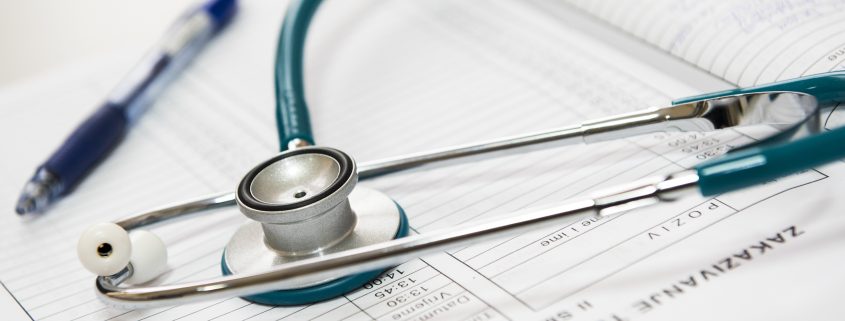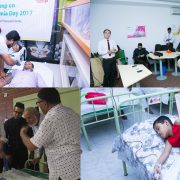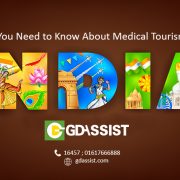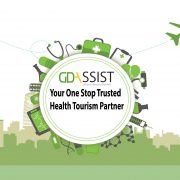8 important things to do before medical treatment abroad
With the global medical tourism market galloping at a compounded rate of 19% , one thing is amply clear. A large number of the world’s population is embarking on overseas journeys to recuperate from afflictions and heal themselves, the treatment of which might not be accessible in their country of origin.
So if you are someone who is planning to take the journey abroad for treatment or are just about to leave for your voyage, this post will be the most relevant for you, helping you ensure that you have a seamless travel experience and draw the maximum healthcare benefit out of your travel. In any case, you really do not want to reach the airport to find that your passport is just about to expire or has less than the stipulated blank pages
So here is a list of 8 important things to do before embarking on medical treatment abroad.
One: Consult your local / family doctor before you take the flight
It is crucial that you turn to your local healthcare expert and brief him comprehensively of your pre-existing condition as well as your reason for travelling abroad for medical treatment. This will help the doctor assess your state and, most importantly, prepare you for the flight ahead, right up to the time you enroll into the hospital. This is especially crucial for patients suffering from respiratory, cardiac, bariatric and neuro-surgical disorders who are vulnerable and might require medication and appropriate preparatory treatment for embarking on the journey. It would also be wise to arrange for follow-up care with your doctor, as any complication post arrival (the chances of which are rare) can be addressed with speed and surety.
It is always wise to keep your local doctor up-to-date with your medical condition – both before and after travel.
Two: Ensure that your passport and visa is in proper order
A visa is a must if you are seeking medical treatment in reputed / recognized specialized hospitals or treatment centers abroad. In some countries like India, the validity of the passport must be 6 months beyond stay with at least two blank passport pages available. For patients who are minors, they have to sign their name inside the signature box in the visa application form or if they are too small, they must have their thumbprint stamped inside the box. To grant a visa, some countries also demand proof of sufficient funds with recent bank statements needing to be submitted along with the visa application form. Moreover, for India, family members or relatives of the applicant also require Medical Attendant visas for travel.
Visas are a must if travelling overseas for seeking medical treatment in specialized hospitals. In India, a medical visa is a must for being allowed to travel to the country for treatment purposes. Since the issue of medical visas requires proper documentation, early planning can ensure seamless and hassle-free grant of visas.
Three: Get your medical records properly arranged and filed
All your medical records must be arranged and properly documented for ease in retrieval. Ideally, the patient’s historical medical records must be photocopied for ease in referencing in case the original copies are lost. Certain types of medical documents, such as non-prescriptive ones like CT scans, must be carefully preserved because they are costly and getting them again can be time-consuming. It is also advisable to prepare copies of prescriptions of all the medicines you take and note product details such as medicine brand name, generic name, dosages, etc. The brand names of medicines differ from country to country and this documentation can come especially handy in case of travel overseas.
Take time out in properly arranging all your medical records and documents because they will be required multiple times during your travel.
Four: Get a one-point contact at the destination hospital
It is imperative for the patient to keep up a constant dialogue with the destination hospital, trying to assimilate as much information as possible. Though doctors at the destination hospital will certainly be well-aware of your medical past and the treatment required before you arrive, maintaining a continual exchange of information will not only help build familiarity but will also prepare you well of what to expect. Doctor appointments and procedure bookings must be done in advance to ensure minimal waiting as well as minimal hospital stay, while also helping you save ancillary costs. Getting a one-point contact at the destination hospital is a must after you have shortlisted the most appropriate one for your treatment.
Build as much familiarity as possible with the destination hospital because, being a foreign patient, it will help you acclimatize with your new environment faster, which will have a direct bearing on your healing process.
Five: Appropriate logistical arrangements can save you time and money and earn you peace-of-mind
For your journey from your home to the airport, ensure that a proper vehicle or, in extreme cases, an ambulance, is available to reach you to the airport. If you live in a remote location and have to take multiple flights to reach your final destination, it is advisable to book your journey on a single airline as they will take care of your onward journey in case of delays or cancellations. As time is of essence, book your tickets such that the waiting period between journeys is minimal. Also, intimate the airline staff of your condition and they will ensure that your journey is as smooth as possible. Moreover, do speak with the destination hospital for airport pickup post arrival. It is also important to understand if medical evacuation is possible in the event the patient is stranded by unforeseen circumstances like earthquakes.
A wheelchair is a boon for passengers with medical conditions and pre-booking a wheelchair is a must for the airline staff to arrange one. Remember, doing so will save you a lot of hassles later on.
Six: Ensure that payment arrangements are in place
It is important for you to consider the most suitable payment options as well as the currency exchange rates, especially since you will be dealing with foreign currency. Hence, careful planning is required for money exchange, which can be done either in the country of origin or at the destination with money exchangers usually available within the airport itself. However, there is a cap on how much forex one can carry while travelling abroad and hence it is most advisable to either carry a pre-loaded / pre-paid card or even a credit card, which is universally acceptable. Have an alternative cash arrangement backup to fall back on in case of emergencies.
It is most advisable to carry extra money, over and above of your projected treatment expenditure, as doing so will help you face emergencies or unforeseen cash shortages.
Seven: Keep your important medical information handy
It is advisable to keep your important medical records and contact information in your purse or hand luggage. This can ensure quicker and adequate responses in case of exigencies. Be particularly careful to not pack medical records, prescriptions or other important contact information in the checked-in luggage as these can be lost or delayed, thereby putting your treatment squarely at risk. It is also essential for you to adequately preserve your medicines to prevent leakages and seepages while keeping the integrity of the product quality intact, especially for long-haul flights.
It is always a good idea to carry extra quantity of important dosages in hand as well as keeping your important medical information handy and easily accessible.
Eight: Give yourself some breathing space
Do not rush on things. It is always a good idea to give yourself time, it is always good to relax and be calm. This can have a tremendous impact to help you heal faster and get you back on your feet again. Is is also good to have a confidante with whom you can speak your mind and consult freely – we all have such a figure in our lives with whom we can talk without inhibitions. Most importantly, it is important to maintain positivity, which can do wonders for you.
Don’t jump to quick conclusions. Take your time, give yourself some space and think of going back to your life when you arrive back home – fully fit and raring to go!
For adding to patient convenience and ensuring that their journey is smooth and trouble-free, there are a number of companies that combine their network strength to provide all the support that he / she needs while travelling abroad. These services can include logistical and visa arrangements, health and travel insurance, hospital selection and bookings, doctor appointments, payment solutions, medical evacuation in emergency cases, etc. But remember to choose a service provider who has a strong track record and can produce quality patient referrals.
Best of luck!












Thanks, it’s very informative